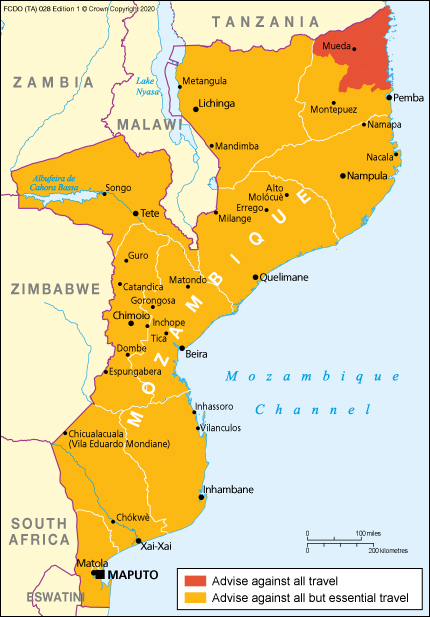
The Foreign, Commonwealth & Development Office (FCDO) advise against all travel to:
- the districts of Mueda, Nangade, Palma, Mocimboa da Praia, Muidumbe, Meluco, Macomia, Quissanga and Ibo in Cabo Delgado Province, including the islands off the coast, due to attacks by groups with links to Islamic extremism.
The FCDO advises against all but essential travel:
- to the districts of Ancuabe and Metuge (with the exception of the city of Pemba) in Cabo Delgado province, including the islands off the coast, due to attacks by groups with links to Islamic extremism.
- on the EN1 road between Inchope and the town of Gorongoza and the EN6 road between Tica and Inchope, in Sofala province. Since August 2019, there have been a number of armed attacks on vehicles on roads in the province.
- to the remainder of Mozambique based on the current assessment of COVID-19 risks
From 4am on Saturday 9 January, visitors arriving into the UK who have been in or transited through Mozambique in the previous 10 days will not be permitted entry. British and Irish citizens, and third country nationals with residence rights in the UK arriving in the UK from Mozambique, need to self-isolate on their return. Check the latest guidance for England, Northern Ireland, Scotland and Wales.
Travel to Mozambique is subject to entry restrictions
- Entry to Mozambique is allowed to all travellers with a valid tourist or residency visa. It is not possible to obtain a visa on arrival in Mozambique
- You will need proof of a valid negative COVID-19 test, issued within 96 hours of your arrival
- Children under 11 years old are exempt from the requirement to present a COVID-19 PCR test
- If you have been in direct contact with someone who has COVID-19, you will be required to self-isolate for 14 days on arrival
See Entry requirements for more information before you plan to travel.
Preparing for your return journey to the UK
If you’re returning to the UK, you will need to:
Check our advice on foreign travel during the coronavirus (COVID-19) pandemic and sign up for email alerts for this travel advice.
If you’re planning travel to Mozambique, find out what you need to know about coronavirus there in the Coronavirus section.
During the COVID-19 pandemic, it is more important than ever to get travel insurance and check it provides sufficient cover. See the FCDO’s guidance on foreign travel insurance.
Terrorists are likely to try to carry out attacks in Mozambique. There has been an increasing intensity of attacks in areas of Cabo Delgado province dating back to January 2019. Militants have used explosives, machetes and firearms to conduct lethal attacks, as well as burning vehicles and homes. Attacks have been carried out on the mainland and on islands off the coast. There are reports of an increased security presence in the province, including road blocks, and there are regular clashes between militants, armed vigilante groups and Mozambican security forces. There is also a threat of kidnap in Mozambique, which is particularly acute in northern districts of Cabo Delgado province. See Terrorism
Coastal areas are at risk from tropical cyclones during the rainy season (November to April). Widespread flooding can also occur around river basins, especially the Zambezi, Pungue, Buzi, Limpopo and Save. The rainy season (November to April) will also make roads harder to pass, and make some areas impassable. Tropical Storm Eloise may bring hazardous sea and weather conditions to Central and Southern Mozambique from Saturday 23 January 2020. See Natural disasters.
Most visits to Mozambique are trouble-free, but violent crime does occur and there have been cases of criminal kidnappings. You should take extra care. See Crime
Traffic accidents are common due to the condition of the roads, poor driving and vehicle standards. Always drive carefully and be aware of pedestrians using the roads. If you’re travelling by road make sure you have relevant documents with you at all times and monitor local media for traffic updates. See Road travel
Piracy remains a significant threat in the Gulf of Aden and Indian Ocean. See Sea travel
Consular support is limited in parts of Mozambique where the FCDO has existing advice against all but essential travel (see above). If you’re abroad and you need emergency help from the UK government, contact the nearest British embassy, consulate or high commission.
The Overseas Business Risk service offers information and advice for British companies operating overseas on how to manage political, economic, and business security-related risks.